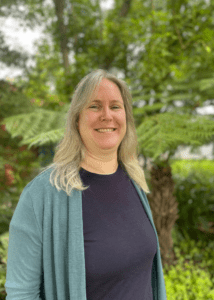
Kirsten Harrild is an Assistant Research Fellow in the newly created Te Kura i Awarua Rangahau Māori Centre at EIT | Te Pūkenga.
In this new feature we interview staff members who are active researchers. In the spotlight Kirsten Harrild, an Assistant Research Fellow in the newly created Te Kura i Awarua Rangahau Māori Centre at EIT | Te Pūkenga.
What is your highest qualification and where and when did you finish it?
I completed a MSc(Hons) majoring in Statistics in 2000. I studied at the University of Canterbury.
Are you currently completing any other post graduate programmes?
No, but I have previously studied Epidemiology, Demography, Health Services Research, and Health Economics at post graduate level at the University of Aberdeen, in Scotland. I am currently enrolled in the Te Pōkaitahi Reo Māori Level 2 course at EIT | Te Pūkenga.
What is your role at EIT?
I am an Assistant Research Fellow within the Te Kura i Awarua Rangahau Māori Centre. I work on the Nourishing Hawke’s Bay: He wairua tō te kai study, conducting research and providing statistical expertise to the project.
What areas do you specialise in?
I specialise in medical statistics, with an interest in public health research, women’s health, and randomised controlled trials.
What research have you been involved in either last year or this year (please give details)?
The vision of the Nourishing Hawke’s Bay: He wairua tō te kai study is to effect improved equity for our pēpi, tamariki, rangatahi, and whānau in health, wellbeing, prosperity, and sustainability by shaping future food systems across Hawke’s Bay and nationally. Our research will inform how we can best influence future food systems using Mātauranga Māori and systems science to better understand, and support schools, whānau and community kai-related outcomes, creating flourishing, environmentally sustainable communities.
How important is research to you as an academic?
I have been conducting medical and public health research for nearly 20 years now. I started doing research for the Medical Research Council, in their headquarters in London, and loved it. My main role as an academic has always been carrying out research; an enjoyable secondary role has been providing courses on medical statistics and health services research.
How supportive is EIT in your research?
EIT hired me to carry out research and has provided a great deal of support to the Nourishing Hawke’s Bay: He wairua tō te kai team.
